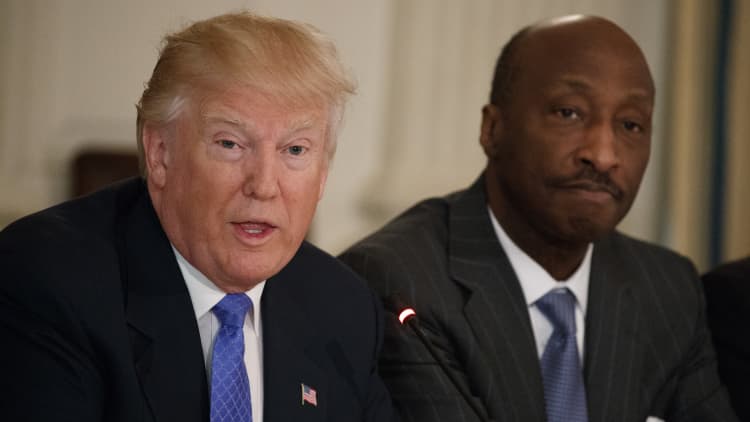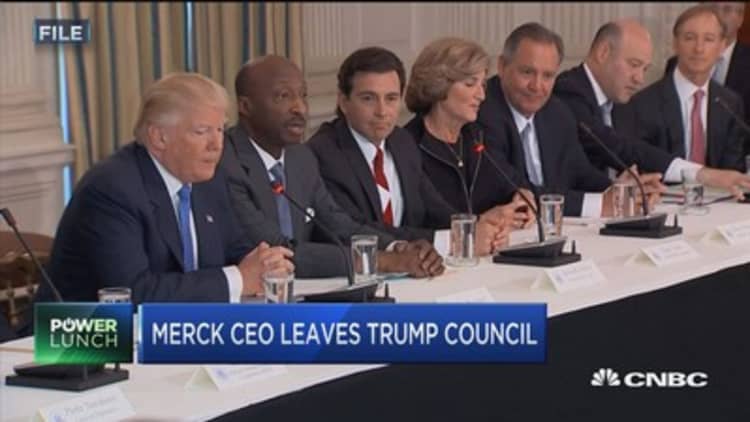
At what point do the C.E.O.s of the largest companies in the United States tell President Trump that enough is enough?
Not yet, apparently.
On Monday morning, President Trump went on a tirade on against Kenneth C. Frazier, chief executive of Merck, the pharmaceuticals giant. Mr. Frazier, one of the nation's most prominent African-American chief executives, had announced through his company's Twitter account that he was resigning from the president's American Manufacturing Council in response to Mr. Trump's refusal over the weekend to immediately and directly condemn the white supremacists and neo-Nazis carrying swastika flags in Charlottesville, Va. Mr. Trump had blamed the bigotry and violence — which left one anti-bigotry protester dead — "on all sides."
More from New York Times:
Is China outsmarting America in A.I.?
Uncle Sam wants your deep neural networks
'Machines of loving grace,' by John Markoff
"America's leaders must honor our fundamental views by clearly rejecting expressions of hatred, bigotry and group supremacy, which run counter to the American ideal that all people are created equal," Mr. Frazier said.
Within minutes on Monday, Mr. Trump, in far less time that it took him to react to the violence in Charlottesville, was on Twitter criticizing Mr. Frazier.
The silence from the larger C.E.O. community about Mr. Trump's reaction to the situation in Charlottesville has been remarkably conspicuous, even as one of their own has now been attacked online by the president.
A few big-name corporate leaders released innocuous statements over the weekend condemning the violence by white supremacists in Charlottesville. But with the exception of Mr. Frazier, none appear to have directly condemned the president's choice of words, which have been a lightning rod for Americans from many quarters, even among many Republican lawmakers and Trump supporters. (The president said at a news conference on Monday, after a barrage of blistering criticism, that "racism is evil.")
The closest thing to a critique of Mr. Trump's language from a United States C.E.O. came from Lloyd Blankfein, chief executive of Goldman Sachs, who tweeted on Monday morning:
(Mr. Blankfein is not on any of the president's councils, which may make it easier for him to be critical.)
But how can so many other American business leaders and senior executives remain quiet about the president's reaction? Where is the moral courage to stand up?
After all, most companies these days spend countless hours talking about their culture and values. Just last week, Google publicly fired one of its engineers within days of his writing a memo that questioned whether "personality differences" between men and women led to there being fewer women engineers in the technology industry.
How can people like Adebayo O. Ogunlesi, a lead director of Goldman Sachs and an infrastructure investor, remain a member of Mr. Trump's Strategic and Policy Forum — a role highlighted on Mr. Ogunlesi's company biography? How could Mr. Ogunlesi, an immigrant from Nigeria who was a clerk to Justice Thurgood Marshall of the Supreme Court, not say anything?
As Justice Marshall himself famously said, "Where you see wrong or inequality or injustice, speak out, because this is your country. This is your democracy."
Mr. Ogunlesi declined to comment, through a representative.
What about Indra Nooyi, the Indian-born chief executive of PepsiCo? She is a member the president's business council and has long been a vocal advocate for minorities. The company said this year that it "does not tolerate bigotry or hate in any form."
When I contacted her about Mr. Trump's remarks over the weekend, a spokesman directed me to a tweet that clearly didn't mention the president:
Some people who have less at stake are going on record to support Mr. Frazier's stance against the president. Tom Glocer, the former chief executive of Thomson Reuters, wrote on Twitter on Monday: "Ken has stood up for true American values. I call on all other members of Trump's image-burnishing committees to do the same."
Privately, many chief executives say they are fuming, outraged by the president. (This after many of them campaigned to get on Mr. Trump's committees.) But many are too scared to say anything publicly that could make them or their company a target of Mr. Trump's wrath.
Indeed, Mr. Trump's vitriol against Mr. Frazier and Merck — a company that depends on the government as a buyer for many of its drugs — will perhaps have an even greater chilling effect on other C.E.O.s who may consider speaking out. (The potential for economic retribution against Merck also demonstrates just how brave Mr. Frazier was in taking a stand.)
When I asked one chief executive Monday morning why he had remained publicly silent, he told me: "Just look at what he did to Ken. I'm not sticking my head up." Which, of course, is the reason he said I could not quote him by name.
The same trepidation may explain why people like Mr. Ogunlesi don't say anything. He runs an infrastructure fund that will most likely have to do business with the federal government. And Ms. Nooyi's PepsiCo, for example, was briefly boycotted by Trump supporters when she made some comments that were construed as critical of him.
Other C.E.O.s, like Jamie Dimon of JPMorgan Chase, have contended that they consider it part of their patriotic duty to remain on the president's business council, even when they disagree with things Mr. Trump says or does.
"It is very hard if you say, I'm going to go off an advisory group or not do a,b,c, because you disagree on one issue," Mr. Dimon said in early June after Mr. Trump withdrew from the Paris climate agreement, a move that Mr. Dimon was against. Elon Musk of Tesla and Robert Iger of Disney resigned from the council in protest.
"Honestly, no one is going to agree with every president or prime minister on every issue, so I don't want to overreact to it," Mr. Dimon said.
Lawrence Summers, who has served as Treasury Secretary and president of Harvard University, said in response to Mr. Dimon's rationale at the time to Bloomberg News: "At what point as a patriot is your allegiance to your country rather to your president? I've always thought of my allegiance as a patriot as being to my country."
A fair critique of the president is that he didn't immediately and directly condemn the bigoted actions over the weekend and call them out for what they were — remarks that tacitly helped normalize such hate.
While C.E.O.s may call out the hate, will they have the fortitude to call out the president?
WATCH: Merck CEO Frazier focused on justice before WH council resignation


